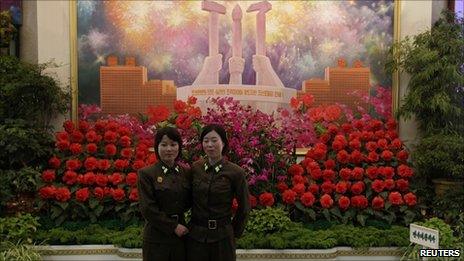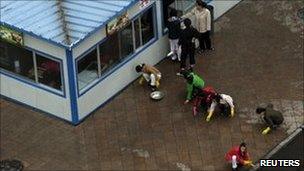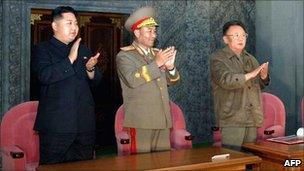North Korea: Where pavements are washed by hand
- Published

The flowers that reflect the devotion North Koreans appear to have for their leader and the nation's founder - kimjongilias and kimilsungias
Politics is everywhere in North Korea - even in the flowers. The country's leader Kim Jong-il and his father, the North's founder Kim Il-sung, both have flowers named after them.
There is currently an exhibition in central Pyongyang showcasing the two blooms, called the "Kimjongilia" and the "Kimilsungia".
It was a holiday in North Korea on Monday, and hundreds of people - soldiers, couples and families with children - wandered around the exhibition centre.
Many had their photographs taken in front of the flowers.
It is a measure of the devotion some people show towards the only two men to have ruled this secretive communist state.
I was given another glimpse of that respect from Pak Mi-gyong, an English-speaking guide at the floral exhibition.

Pavements in Pyongyang are washed with scrubbing brushes and cloths
I asked to take her picture in front of a giant portrait of the two Mr Kims that hung at one end of the main hall.
She warned me that when taking a photograph I must be careful and include the men's whole bodies in the frame.
"They are our leaders and we respect them from the bottom of our hearts. We don't allow other people to cut the pictures of them," she said, a little angrily.
Heir apparent
This is the country that Kim Jong-un, the man expected to be its next leader, will inherit.
The twentysomething's position as heir apparent seems to have been confirmed over the last few days.
He appeared alongside the current leader - his father - at a performance of the Arirang Games and at a major military parade, to mark the 65th anniversary of the Korean Workers' Party.
Peter Hughes, Britain's ambassador in Pyongyang, is just one who believes the younger Mr Kim will take over when his father dies.
"These events were designed to introduce him to the North Korean people, who have not known who he is, and also to the world," he told the BBC.
North Korea is about as isolated from the rest of the world as it is possible to be. There are few visitors and most of those are restricted to looking around a few chosen spots in Pyongyang.
Isolation has allowed the North Koreans to develop a way of living seldom seen elsewhere.
People cut the roadside grass with scissors, a time-consuming act, and wash the city pavements with scrubbing brushes and cloths, items usually reserved for the home.
The city is drab and colourless and there are few new buildings going up.
The country is desperately short of outside money to help it modernise, but business people are wary of investing somewhere that might not protect their investment.
Show city

In what direction will heir apparent, Kim Jong-un, take the country?
Perhaps more than a million people died in a famine in North Korea in the mid-1990s and the World Food Programme still feeds millions of people here.
There are few signs of food shortages in the capital though. One set of roadside stalls was selling roast chicken, sausages and pancakes - even ice creams.
But food was apparently scarce in Pyongyang between January and mid-February this year, following a disastrous currency adjustment in North Korea at the end of 2009.
Even now the situation could be bad outside the capital.
The UK ambassador said: "Pyongyang is a show city and people live comparatively well here, but outside the capital it is tough."
"There is no starvation, we have no evidence of that, but there is certainly chronic malnutrition and people have a very hard life."
North Korea is like nowhere else in the world. Globalisation has reduced the differences between many places on the globe.
But this secretive communist state still clings to the past. Will the man expected to become the country's next leader embrace the future?
- Published10 October 2010
- Published13 December 2013
- Published10 October 2010
- Published29 September 2010